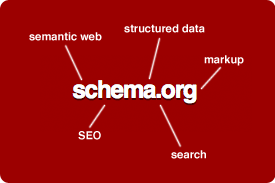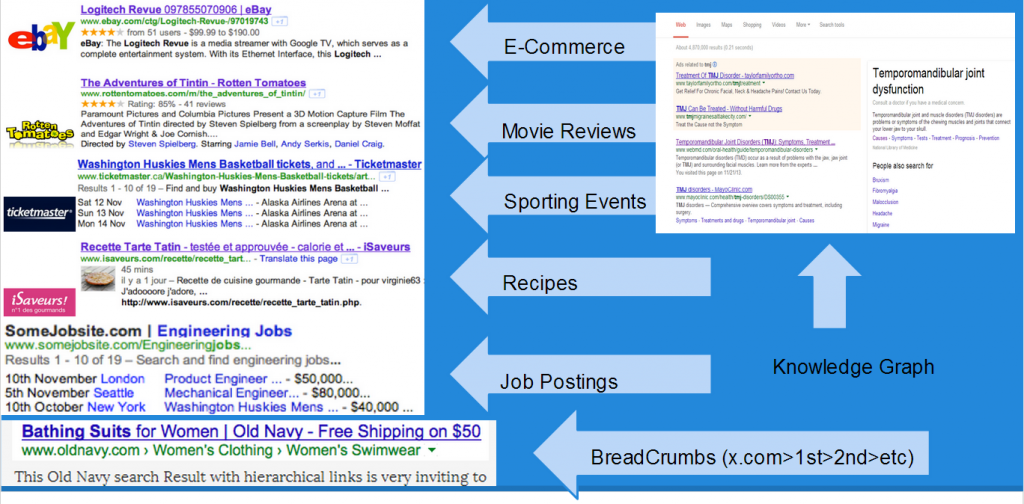Schema.org’s Impact on SEO
When we embrace change with open arms, one of two things can happen. One, horrible things can happen, in this humble writer’s opinion, Google’s Panda update is a great example that really destroyed a lot of the low hanging SEO fruit and damaged the industry. The second scenario, we are rewarded with success when we choose to obey and not bite the hand that feeds. The latter being a great example of schema.org rich snippets.
Let’s take a step back and discuss what Schema.org rich snippets are. Schema.org is a multi-corporation partnership consisting of Google, Yahoo! and Microsoft, who’ve pooled together to create a universal markup language for simplifying users searches and giving yourself priority over sites that do not have schema, to bring in those conversion rates that you’ve been desiring, oh so much. Why would these mortal rivals pool to make something creative and useful? Here’s what schema.org has to say about that;
“Q: Why are Google, Bing, Yandex and Yahoo! collaborating? Aren’t you competitors?
Creating a schema supported by all the major search engines makes it easier for webmasters to add markup, which makes it easier for search engines to create rich search features for users.“
Here’s a real world example of what exactly Schema.org rich snippets are. You’re writing a blog post, and you say,”I love Mercedes.” Now when you’ve saved this and submitted your sitmap.xml file, about 4 weeks later when Google comes around to index your new posts, it has one of two ways of reading this phrase. I love Mercedes(car), or I Love Mercedes(Woman). In this example we’ll say you have not used schema.org markup, so now your webpage is in limbo and in all actuality you wont be ranking for either. Let’s go back in time 4 weeks, and teach you about schema markup. Now instead of, “I Love Mercedes”, it looks more like;
<div>
itemscope itemtype="http://schema.org/cars'>
I Love <span itemprop="name">Mercedes</span>
</div>
Whoa, mind blown. Google now sees your love for mercedes, not as a mistress but as an automobile. Now you’ll be properly indexed and all your visits will be a lot more natural and organic, with significantly less bounce rates than previously before. Schema.org has a large database that the search engine consortium is constantly updating that can just about cover and feasible event, award, medical practice or local business. Here’s my rule of thumb: If it’s a verb or a noun, they have specific diction to be used documented on schema.org that you should be using.
Next big problem, and definitely the most intimidating: How do I learn this?!
Google has got you covered again. http://www.google.com/webmasters/tools/richsnippets provides you with an easy to use GUI to markup all your pages in a timely manner and spit out the HTML necessary for you to copy and paste your way to first page results with zero knowledge of any geeky programming language. That’s right, you get to avoid the pocket protectors and the Klingon language because of Google, lucky you.
Here are some of the main categories that you can expect to find at Schema.org with their definitions. Keep in mind, there are so many sub categories that it is not worth listing them all, and for simplicity’s sake you should use google webmaster’s structured data tool for most if not all your schema needs. (Unless you are going for a super-niche market, or niche consumer base.)
THESE ARE ROUGH DEFINITIONS AND VARY GREATLY DEPENDING ON USEAGE
http://schema.org/Thing/(insert one of the below)
Each of these topics below are broad encompassing topics that provide ease of access by narrowing it down by what you want to do. SEO wise, you’ll have to use good judgement on what you exactly want to promote to Google, and what not to promote.
-
/Action (EXAMPLE: The location of the event, organization or action. When the Action was performed: start time. This is for actions that span a period of time. e.g. John wrote a book from *January* to December.)An action performed by a direct agent and indirect participants upon a direct object. Optionally happens at a location with the help of an inanimate instrument. The execution of the action may produce a result. Specific action sub-type documentation specifies the exact expectation of each argument/role.
-
/Broadcast Service(EXAMPLE: The organization owning or operating the broadcast service, or The area within which users can expect to reach the broadcast service.) A delivery service through which content is provided via broadcast over the air or online.
-
/Creative Work(EXAMPLE:An award won by this person or for this creative work, The publisher of the creative work, or The organization or agency that is providing the service.) The most generic kind of creative work, including books, movies, photographs, software programs, etc.
-
/Event(EXAMPLE:The location of the event, organization or action, or A person or organization attending the event. ) An event happening at a certain time and location, such as a concert, lecture, or festival. Ticketing information may be added via the ‘offers’ property. Repeated events may be structured as separate Event objects.
-
/Intangible(EXAMPLE:Really niche markets, or otherwise unstated markups would fall under Intangible ) Not Relevant (Alignment Object, Audience, Brand, Demand, Enumeration, Job Posting, Language, Offer, Permit, Quantity, Rating, Service, Service Channel, Structured Value)
-
/Medical Entity(EXAMPLE: If applicable, a medical specialty in which this entity is relevant, or A medical study or trial related to this entity.) The most generic type of entity related to health and the practice of medicine.
-
/Organization(EXAMPLE:A logo associated with an organization, a local business, a review, a telephone number, an employee. ) An organization such as a school, NGO, corporation, club, etc.
-
/Person(EXAMPLE: Owner, proprieter, customer, patient, doctor) A person (alive, dead, undead, or fictional)
-
/Place(EXAMPLE:a map, an event, a phone number, an address for a business ) Entities that have a somewhat fixed, physical extension.
-
/Product(EXAMPLE:Release date, reviews, logo, manufacturer ) A product is anything that is made available for sale—for example, a pair of shoes, a concert ticket, or a car. Commodity services, like haircuts, can also be represented using this type.
-
/Property(EXAMPLE: connected pages that are different locations but still the same business. Multiple storefronts, but all websites are owned by the same entity) A property, used to indicate attributes and relationships of some Thing. (another website that the primary website owns
Let’s talk business, and get down to brass tacks. Results. Here is an image of what kinda of changes you can see by adding these schema markup rich snippets.
As you can see, is you correctly markup applicable Schema, you can bring proprietary data that is typically not indexed on the SERPs your page pulls up in. Awesome sauce!
As you can see, schema.org is a great resource and a free, and a plainly more effective alternative to keyword stuffing or any other futile attempts to manipulate your rankings. Schema.org. Use it.
By Brayden Hord
Google



